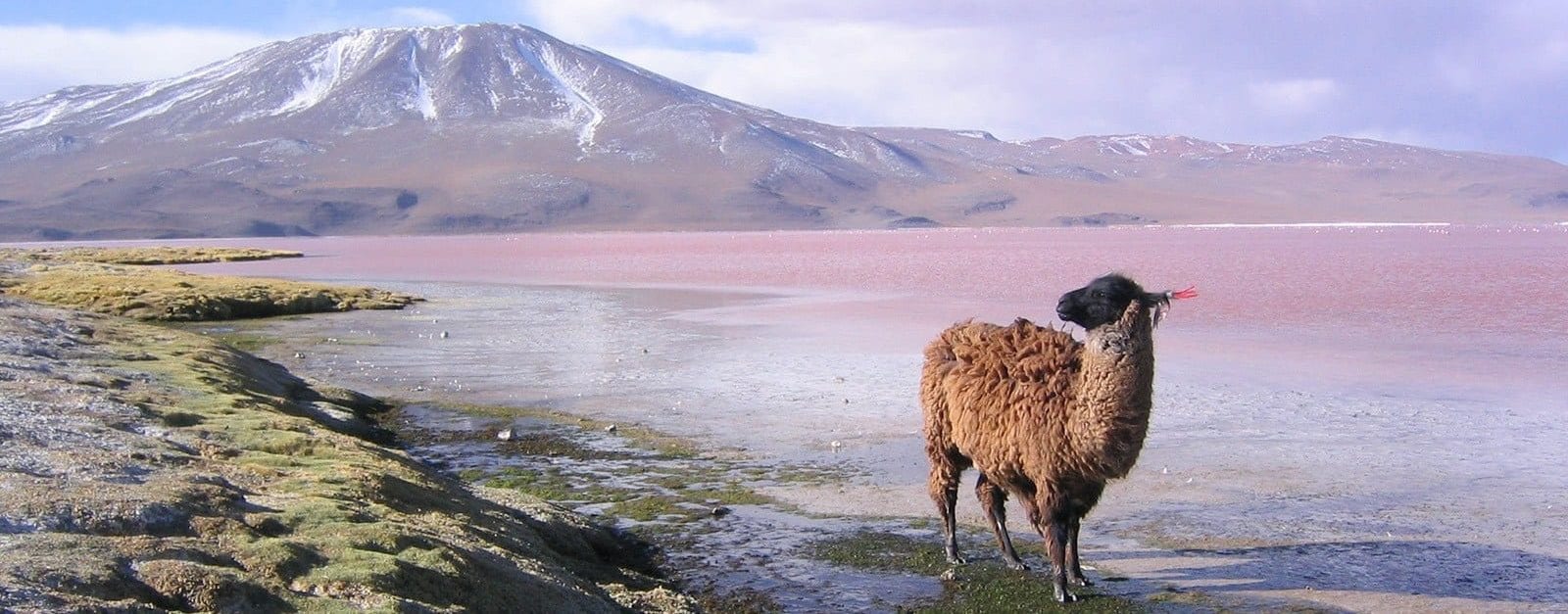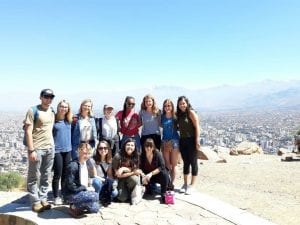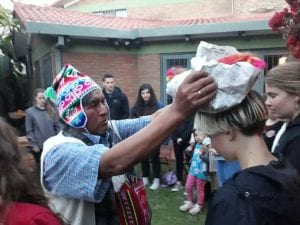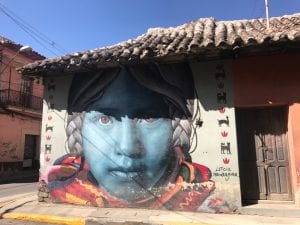My entrance in Bolivia was less than graceful — I was sleep deprived from three flights and a long-ass layover, sweaty (as always), and covered in black in from the pen that had exploded on me while I tried to fill out my immigration forms. I said a silent goodbye prayer to my favorite white t-shirt, now splattered in ink, rubbed my palms together with the hope my sweat would wash them slightly, and chugged ahead (you know things are looking up when you rely on your sweat to clean yourself…)
I’ve been here for three weeks now, but it feels like forever. I’ll try to think back to what was going through my mind on the first day.
Yup, it was definitely “what the F$%&!”
After a disorganized round of hellos and my-name-is at the Cochabamba airport, the 11 other students on my program and I piled into a brightly colored bus and went on our way to the hotel we would stay at for orientation week.
The Squad
On the first day we were given a “cultural adjustment rollercoaster” sheet, complete with the stages we should expect to go through throughout the semester — honeymoon, culture shock, gradual adjustment, unresolved problems, and adaptation. I laughed/cried to myself, thinking “I went through all five of those in one day.”
On the second day, we participated in a traditional K’oa ceremony — an act of reciprocity to Pachamama (mother earth) — led by Aymara priest.
A by-no-means-holistic list of things I have learned quickly in these three weeks:
It is a cultural norm to kiss everyone on the cheek when you enter and leave a room. Getting the right amount of lip and “smooch” noise has been a process (at first I would go in WAY to hard and really lay it on them) but after three weeks I think I’m getting less slobbery. Mmmm. I actually love this norm, and think the world would be better off if it was implemented everywhere.
If you take out food in front of other people, you share it, even if it is a granola bar. This is another cultural norm that I really think would make the world a happier, kinder place.
I’m technically not supposed to be eating any raw fruits/vegetables all semester….(I’ve definitely already done this).
Tap water is a no-go. This is easy to remember when I go to drink water in my house, but more complicated when restaurants water down their ketchup with tap water or ice cream shops rinse their scooper with tap water between scoops. My philosophy has generally been that I will absolutely get sick at some point, the questions are just how badly and how many times.
Apparently you should not worry when Pepto-bismol here turns your tongue black. I haven’t experienced this yet, but I am intrigued.
Do. Not. Pet. The. Dogs.
In Bolivia, everyone adds “ita/ito” at the end of words. If someone calls me “gordita” (chubby girl) it is meant with the utmost affection. This hasn’t happened to me yet, but yesterday when the entire family of my host dad was over, a woman slapped my thigh and said “¡ayye que grande!” The amount of bread and potatoes I have been eating combined with the fact that it is rude to refuse food is not helping.
As I spent my summer in San Francisco commuting 3 hours a day, and now I’m in Cocha commuting 2 hours a day (we go home for lunch and a siesta as it is the biggest meal of the day), transporte público has been a big part of my life for the past couple of months. In SF I would be on the bus, look around, and fail to make eye contact with anyone because everyone — including myself for the most part — would be on their on their phones, plugged into their own little world. Here in Cocha, if you have your phone out in public you might as well be wearing a sign on your forehead that says “please steal my phone.” While I do miss music on the bus sometimes, being more present has made me get to know the city better, practice my Spanish, and notice things I otherwise wouldn’t have. Plus, I still have my phone. For now.
Anyway, MY HOST FAMILY! They are angels, truly. I have a host mom and dad, a host sister, a host brother, and a host dog. They are all so understanding of my Spanish ability (the dog most so), and are always willing to slow down and repeat things. Sometimes I nod when I actually have no idea they’re talking about, and my host sister Elo will ask “do you know what *enter Spanish word* means?” and I will shamefully admit that no, I don’t, and I was just nodding because I hoped the movement would magically bring me some clarity. They also all have a great sense of humor, and it is fun to know that my jokes can cross cultures and language barriers. I already feel genuine love for them all. For the most part, Bolivian families are pretty huge, so there are people (and babies!!!) coming and going often.
Oh yeah, I’m also going to school. I am taking four classes (all in Spanish) — Historical and Contemporary Social Change in Bolivia, Research Methods and Ethics, Vivir Bien: Well-Being and Resilience in Andean and Amazonian Communities, and a Spanish language class. During the last month of the semester I will be completing an Independent Study Project, which means I will be living in any Bolivian city of my choice, researching and writing about whatever I choose. As of right now, I am thinking that I want to look closely at the upcoming Bolivia presidential election. The current Bolivian president and the first indigenous president in Latin America, Evo Morales, is currently attempting to run for a fourth term, overruling the term limits that he himself put into place when he rewrote the Bolivian constitution in 2009, and ignoring the 2016 referendum in which voters rejected the notion of doing away with term limits. He has made some incredible changes for Bolivia and the indigenous communities here (which is 60% of the country), but to a lot of people, his blatant disregard of the voices he claimed to represent in his platform is a slap in the face, and indicative of previous Bolivian, and other South American dictators. If I chose to study this, I would be interviewing Bolivians of all economic, ethnic, and racial, backgrounds, as well as professors and politicians, trying to understand where people’s heads are on this issue, and what is being done to support/protest Evo. As a Politics major who walks past “Bolivia dijo no” (Bolivia said no) graffiti daily, the reelection seems like a good place to invest my time. Though, I am so interested in most everything I have learned about thus far, so my topic is subject to change.
This post has been a jumbled mess of word vomit (a metaphor for how it sounds when I try to discuss complex politics in Spanish?) so I will sign off. Tomorrow we are flying to Potosi (which was once the third largest city in the world) to learn about the mining communities there, and then off to Sucre. I feel so lucky to be here — I have so much to learn from this beautiful country and the people in it.






